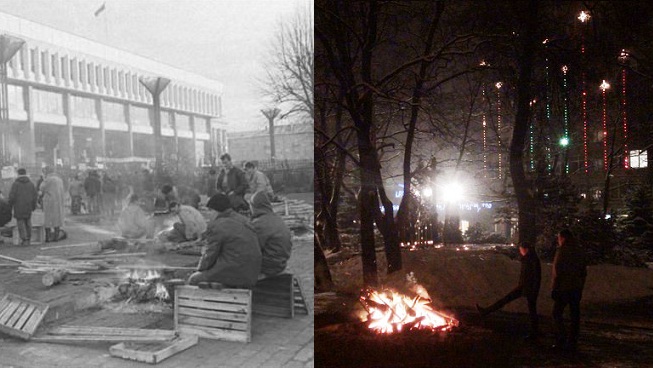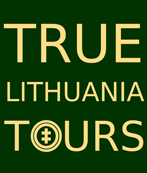National (Patriotic) Holidays of Lithuania
Lithuania has as many as three state holidays. July 6th, the State Day, commemorates the coronation of the country's first and only king Mindaugas in 1253 (the true date of the event is based on a modern calculation, however). February 16th, the State Restoration Day, reminds of the declaration of Lithuania's independence in 1918 and is typically considered the most important. March 11th, the Independence Restoration Day, recalls the year 1990, when the first post-WW2 democratically elected Lithuanian parliament declared the end to the 46-year-old second Soviet occupation, triggering the collapse of the Soviet Union.
In addition to these glorious dates, every single of them non-working, several sad dates are observed. These are the June 14th (Day of Grief and Hope), when in 1941 the Soviet genocide commenced by exiling tens of thousands of Lithuanians to Siberia in cattle carriages, later joined by several times that number, many of whom died en route or after arrival. Occupation and Genocide day on June 15th recalls the year 1940, the year when Soviets occupied Lithuania for the first time, later followed by Nazi German occupation and another Soviet occupation. January 13th, 1991 was the day when the Soviet troops unsuccessfully attempted to squash the Lithuanian freedom aspirations by force (14 armless civilians died, hundreds were injured). It is now celebrated as the Day of Freedom Defenders. Black Ribbon and Baltic Way day remind the August 23rd of 1939 when Soviets and Nazi Germany partitioned Europe by signing the Molotov-Ribbentrop pact, and August 23rd of 1989 when Baltic peoples have demonstrated an unmatched solidarity in creating a live chain from Vilnius, Lithuania to Tallinn, Estonia in condemnation of the 1939 pact. Flags are downed by one-third or coupled with a black banner during these days.

January then (Parliament, 1991, left) and now (Lithuanian TV HQ, 2012, right). Commemorative bonfires are now lit every January 12th evening at the locations where tens of thousands armless people once tackled cold this way while courageously waiting for Russian troops to come (some spent months without returning home). ©Alfredas Girdziušas (left), ©Augustinas Žemaitis (right).
January 1st is the National Flag day, marked by the choreographed replacement of the "country's most important flag" on the Gediminas Hill castle tower in Vilnius (in reality this flag is replaced several times a year due to wear, but other replacements go unpublicized).
It is frequently claimed that such a large number of commemorations and independence dates tells of a sad history of Lithuania, full of upheavals. Despite the number of national days, their celebration is minuscule compared to the similar days in America, although they have been increasing in recent years. Under the Soviet occupation (1940-1990), all Lithuanian national holidays used to be banned (with police (militia) presence increased to prevent spontaneous commemorations), therefore any historical traditions died out.
In the 1990s-2000s, there were only officially sponsored, state, church or municipality funded events (public speeches, holy mass, military parades), while for most people these days were simply a time they can rest from working.
In some 2000s a grassroots movement to organize street parades on the national holidays commenced - with flags and patriotic chants on the happy anniversaries and with candles on the sad ones. The parades have met opposition from groups such as the far left and non-Lithuanian nationalists who regularly attempt to disrupt them. The anarchists regarded the patriotism itself to be dated, while certain foreign nationalists and communists dislike any reminder of the Soviet crimes. In an attempt to smear the parades, their opponents even labeled them "neo-nazi", although this has little basis as the absolute majority of participants are moderates, with foreigners who support Lithuanian freedom also participating. The only side failing to abide the laws during these parades were typically their opponents.
11th of March parade in Vilnius (2012). ©Augustinas Žemaitis.
The situation of the celebration (or lack thereof) of Lithuania's national holidays correlates with the general situation of patriotism. In the Soviet Union, Russian nationalism was condoned, but any notion of minority (including Lithuanian) nationalism was seen as dangerous and labeled fascism. This idea stuck somewhat, with some people, primarily the Russophone minorities, still finding Lithuanian patriotism to be suspicious, especially when it comes from a non-state-sponsored source. To this day "nacionalizmas" ("nationalism") holds a deeply negative meaning in Lithuanian language, similar to "fascism". The relative poverty of Lithuania, compared to Western Europe, also induces some people to publically denounce their homeland and nationality. On the other hand, the state symbols, such as the flag and anthem, always remained more or less respected by Lithuanians, but a deeper glorification of Lithuania may evoke controversy in what is a self-conscious nation.
However, ~2010 the situation began to slowly change. Less controversial attempts to forge new traditions for Lithuanian national days were sponsored by media. One such event, commenced in 2009, suggests every Lithuanian, whether home or abroad, to sing his homeland's national anthem on a certain time on July 6th. The anthem is also played on some TV and radio channels at this time.
The 100th year anniversary of the Republic of Lithuania (2018) that had many interesting commemorational events, coupled with the increased perceived risk of Russia to Lithuanian freedom, may have finally turned the tide as celebrating the Lithuanian national holidays became fashionable among youth and many grassroots events would take place: they are still far from universal, but are not necessarily denounced as either "official and boring" or "supposedly radical".



Leave a comment